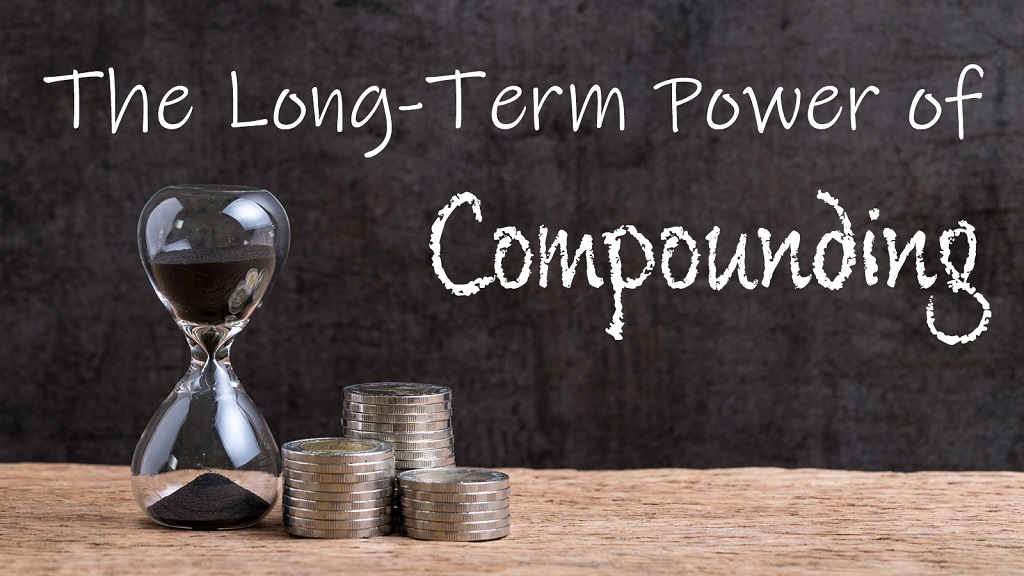The Long-Term Power of Compounding: Understanding the Impact of Market Volatility on Retirement Investments

First, just a word on the Coronavirus. This is something that is more serious than the seasonal flu. We, as a country and as a community, will need to engage in social distancing, and social distancing will have an economic cost. Fewer people will travel, eat out, watch live sports, go shopping, go to the chiropractor, etc. etc. In short, there will be fewer transactions and less economic activity overall for a period of time. When economic activity is lower, the profits of the companies in your retirement investments will also be lower for a period of time. If their profits are lower, the price should come down. That is exactly what is happening. It is normal and natural, and we will get through it, but not without some disruption. The elevated levels of volatility in the market are likely going to continue for some time, as the virus causes uncertainty regarding the overall effect on the economy and, ultimately, corporate profits.
We will get through it, and when we do, it is likely we will see a pronounced upside in stock prices. But, until the virus has run its course, it is important to stay disciplined and remember that investing is a long-term endeavor.
For those of you who are investing in a distant future retirement, this is a wonderful time for you. Each one of your contributions buys more stock when prices are down like they are currently. Stocks are on sale and you should buy all that you can when prices are down. Don’t worry about your balance. Focus on contributing all the way through this downturn. The more you add now (especially at low prices), the longer time period you have to allow compounding to do its job. Compounding has been called the 8th wonder of the world, and for good reason! It is a powerful force that caused growth in growth. Compounding allows things like money (and viruses, unfortunately) to grow exponentially. 10 becomes 20 becomes 40 becomes 80 becomes 160 becomes 320. The question you should be asking is: if I increase the numbers early in the chain, what impact does that have on the ending numbers? Well, instead of starting with 10, let’s imagine you contributed more when you were young. Let’s start with 20 instead: 20 becomes 40 becomes 80 becomes 160 becomes 320 becomes 640. The compounding effects of early contributions are amplified over time and instead of ending with 320, we have 640. This is a very simple example that ignores contributions over time, but it illustrates the power of compounding. Use compounding to your advantage.
If you are closer to retirement, don’t forget retirement isn’t the end, it is just the start of a whole new part of your life. And your investment will continue to be there for you if you remain calm and stay invested. You are also in a position to take advantage of buying stocks at low prices, but you might be (understandably) more anxious than younger investors. You have been diligently building your balance over time, and it can be nerve-wracking to see the balance drop.
The first thing is: don’t panic. This is very important. Markets are volatile. That is absolutely true, but they are volatile in two directions: up and down. We are down some now, but that can change faster than you can say, Baker Boyer. If you sell stocks because you are nervous, you are taking one of the biggest risks in investing: the risk of missing the upside. The only investors I know of who make bad mistakes in the 2008-09 downturn were those that sold stocks and waited for a “safer” time to invest. After March of 2009, that “safer” time never came. The market charged up, in spite of scary headlines, and never looked back. That is a risk few can afford to take. Fortunately, we can eliminate that risk by simply staying invested. That way, we’ll catch all of the upside, which over time has been substantial.
Instead of trying to time the market, think instead of the portfolio that you can stick with through thick and thin.
It is important that the portfolio you select is appropriate for you. It should fit with your ability and willingness to accept the volatility that comes with investing.
If you have any questions about selecting an asset allocation, please don’t hesitate to reply to this email and I’ll get you connected with someone who can assist you in making an informed choice. We have built investment portfolios at every level of risk and return. We’ll find one that suits you. Never forget that our portfolios are made up of stocks and bonds, and our bonds have done beautifully during this period of volatility. They will provide us with the ability to buy stocks on sale now in anticipation of a future recovery.
Data strongly supports a calm, deliberate response to a market downturn, one that focuses on using strong bond returns to rebalance into lower-priced stocks. The chart below clearly illustrates that a stock market sell-off is typically following by strong equity market returns.

The bigger the sell-off, the bigger the subsequent returns. As of the writing of this article, the S&P is down from its highs by over 20%, so the data on the right side of the chart apply. This implies a high likelihood that equity returns will be strong on average over the next 1, 3, and 5 years. Rebalancing is something we do as a regular part of managing investment portfolios.
For more information on our thinking regarding the economy, the markets and the impact of the virus, visit our web site at www.bakerboyer.com or feel free to reach out to a member of your team at Baker Boyer. If you don’t currently work with Baker Boyer, we would be happy to talk with you about our approach to providing investment, financial planning, and business advice.
Wash your hands, remember that social distancing can feel disruptive, but saves lives in our community (literally), and be patient with and kind to the people around you as we get through this. We are all experiencing these disruptions in ways that are very different and very personal.
Take good care,
John



